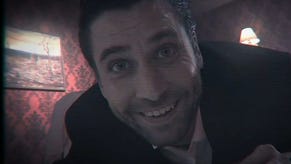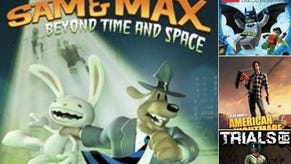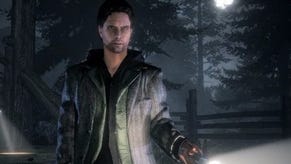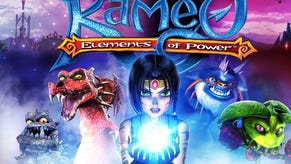Alan Wake's American Nightmare Review
Wake-up call.
After five years in development, it was hardly a surprise that every brow associated with Alan Wake was furrowed into an irretrievable state of seriousface. And when it did at last arrive, that was the game's problem: it looked great, had a nicely creepy atmosphere, the action mechanics were solid; but, goodness, it didn't half take itself seriously.
This was most potently symbolised by Wake himself, a dreary, po-faced bore (yes, it takes a writer to know one), forever framing the world around him in self-absorbed cliché. For a game with blockbuster literary aspirations, it's a bit of a problem when it delivers a straight-to-DVD script.
The character now returns, not in another fussily self-conscious epic, but as an Xbox Live Arcade title knocked out for fun on the side - and what a difference that has made.

Alan Wake's American Nightmare is split between Story and Arcade modes. The former offers familiar narrative-driven fare, while the latter is a challenging survival experience in which Wake must try to stay alive until dawn.
Moving away from the lugubrious Stephen King and David Lynch homage of the original, Remedy has plumped for a pulpier, Tarantino-esque feel in American Nightmare. The game plays out as an episode of Night Springs, the Twilight Zone-aping TV show penned by Wake himself - and in which he is now, apparently, trapped.
Once again, the relationship between Wake's writing and its mysterious effect on his present reality are explored, as he appears "somewhere in Arizona", mocked and mauled by Mr. Scratch, his serial killer doppelgänger (who you may remember from the previous game).
Given the price tag (1200 Microsoft Points, or £10.20) and nature of this release, there's a limit to how much content could reasonably be expected while maintaining quality. In order to provide the good five hours' worth of gameplay there is in Story mode, then, Remedy's solution is to limit the number of areas and instead have the player repeat them in a way that's tied directly into the unfolding story.
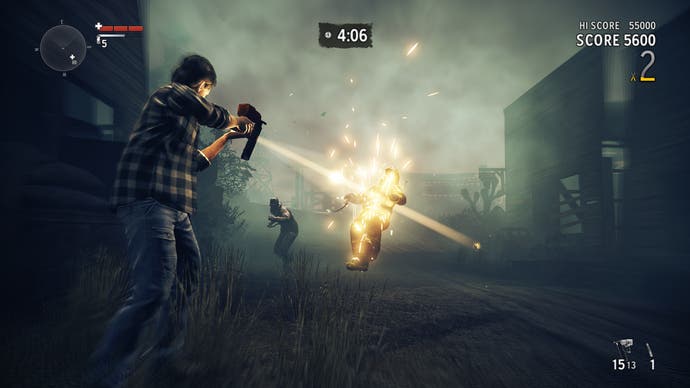
It's a neat idea that works well in practice, with enough variation and tightening of sequences to keep at bay any sense of it becoming a repetitious, arbitrarily drawn-out slog.
The switch in genre puts Wake in more comfortable territory. A silly premise is clearly more enjoyable when the game revels in that silliness with a nudge and a wink, and the clunking dialogue becomes more tolerable, even wryly amusing (whether intended or not).
The story is never rammed down the player's throat. The pleasingly cheesy TV show narration maintains the set-up while keeping things rattling on - and it's certainly preferable to listening to Wake's tortured internal monologue drone on.
Further background details can be gleaned from manuscript pages, scattered throughout the game, additional exchanges with the handful of NPCs, and TV and radio broadcasts. You're not required to sit through any of this, but I enjoyed wringing out as much info as I could at my leisure. Meanwhile, manuscript pages unlock new weapons for use in all game modes, so there's a decent incentive to wander off the beaten path every now and then.
Story aside, Wake ultimately succeeds because its action mechanics are so satisfying to use. The left trigger boosts the beam of Wake's torch, to blast the shield of darkness from the Taken so they are vulnerable to gunfire, via the right trigger.
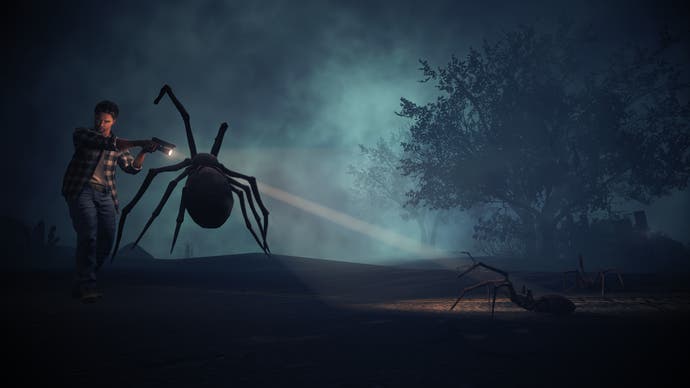
There's a decent range of weaponry, from standard pistols and shotguns to a nail gun, crossbow and hunting rifle (whose bullets can pierce multiple enemies). Wake's foes become increasingly wily and formidable as he progresses: Taken who burst into a flock of birds that swooshes around before re-materialising; giant, circular saw-wielding hillbillies; grenadiers, who prefer to keep their distance; and Splitters, which multiply when a light is shined on them.
When the odds are overwhelming, flares can be held or chucked with the right bumper, and the flare gun makes a welcome return, limited in ammo, but generous in destructive power.
The other half of the package is Arcade Action. Split across five maps, with environments distinct from Story Mode, the goal is simply to "Fight till dawn!" - 10 minutes of wave-upon-wave of Taken. Horde mode, in other words.
A well-timed press of the dodge button in the heat of battle to make Wake, down to his last sliver of health, duck a murderous strike in slow motion, remains enormously satisfying - even more so here, as you'll be using it rather a lot. Bolstered by the solid controls, Arcade proves both good fun and good for leaderboard rivalry, though I did find myself yearning for co-op (sadly not included).
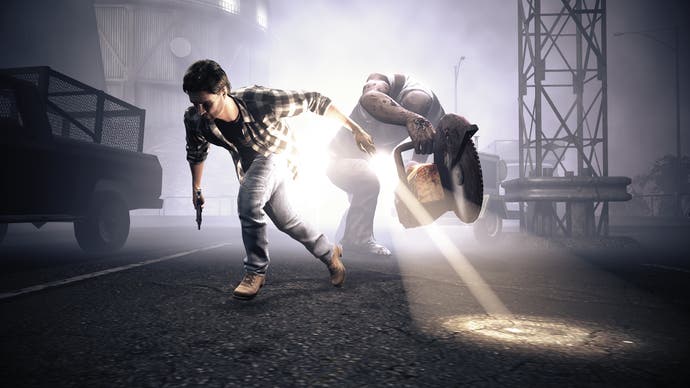
Remedy's starting point for this download-only experience was survival mode, apparently. Given the lack of multiplayer, that would have made for a less enticing sell; but with a solid five-hour narrative bunged in, the whole package represents excellent value for 1200 Microsoft Points.
More than that, the character himself simply feels more at home in this shorter, punchier, less laboured and self-regarding form. Freed from the weight of expectation that accompanies a full retail release in this genre, the experience - while lacking the set-piece spectacle and spookiness of the original - is less forced and more comfortably pitched.
As the title intimates, the story ends with question marks lingering over the nature of Wake's experience. But even if it really is his nightmare, our troubled writer is arguably better company asleep than awake.





